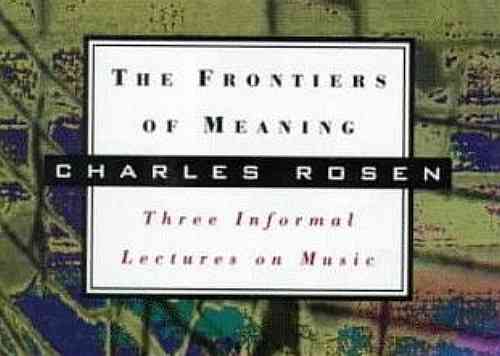
N ow I’m supposed to write a paper reflecting on my playing and my learning process, which in turn are reflections of my literacy and adherence [or not] to the assignments. If I have to write this reflection paper of my reflecting on my reflections, I will ... do badness to something or someone. I have no idea what to write.”If you’re in school, then chances are your assignments include writing one or more ‘reflection papers’ this semester. The task of writing an essay on your own experiences and applications and first-hand gleanings forces you to collect and distill and categorize: you critically evaluate your experiences and place them into context; the narrative form forces you to write about your own impressions and explain the context into which they fit. Quelle horreur!
— Anonymous.
Reflection papers aren’t a pedagogical punishment. Throughout your career, you can and should invest in improving your musicianship through regular journaling. This is in addition to whatever other activities you engage in for performance, composing, producing, engineering, arts marketing, artist management, presenting, teaching, listening—whatever you do musically. Writing ‘reflection papers’ is just one way for you to harvest and preserve the experiential learning that you do in those other activities. It’s a way to connect the work with the learning.
Why journal? (Why blog?) Mostly to keep yourself learning and growing, and to force yourself to clarify your thinking and revisit and retest your convictions—especially ones that may never’ve been fully thought-through in the first place. Consider it as a dimension of your training, just like practicing on your instrument(s)—it keeps your mind from getting old or rusty or atrophied. Use it or lose it!
W hen I don’t practice for one day, my fingers know it; for two days, my friends know it; for three days, and the whole world knows it.”Journaling is about the shape and meaning we assign to our experiences. Our stories are about who we are, where we’ve come from, and where we think we’re headed and why. What you want to do is get ideas and explore ideas. You want to assemble evidence and counter-evidence, and critique the quality and strength of both.
— Ignacy Paderewski.
How to go about it? I think it helps to have at least one or two examples as ‘benchmarks’ to serve as guides and reminders of the writing qualities you admire. For me, the epitome of writing that is at once erudite, elegant, and entertaining is pianist Charles Rosen. His little 1994 book ‘Frontiers of Meaning’ is, for me, iconic. Kyle Gann’s ‘Music Downtown’, emblematic of journalistic bravery. Alex Ross’s ‘The Rest Is Noise’ has a different tenor but serves to remind me of how wide our palette can be. Arnold Steinhardt’s ‘Indivisible by Four’, reminds me of grandfatherly patience and generosity in the life lived and the life written-about. You don’t have to write books as they have done. But our own writing will be better if we look frequently at how our favorite authors write.
The best book I know that specifically covers journaling and reflection papers as a practice for working artists is Buck’s. If you’re looking for practical guidance on how to go about writing a reflection paper (whether for your class assignment, or independently for your own professional growth), I recommend you pick up a copy. Check out the other books below, too.
Ultimately, critical analysis and interpretation aren’t detached acts; not value-neutral reportage. No, as a kind of psychological counterpart to Heisenberg’s Uncertainty Principle in physics, the acts of observing and journaling change the things you are observing and their relationships to each other. The personal change is the source of the value in writing reflection papers: the change enables further growth in your playing or composing or listening. Paradoxically, the infinite regress that Anonymous complained about above is actually the whole point of the exercise. Rather than ending in confusion, the process makes you figure things out; makes you figure out how you figured them out; makes you figure out how ‘figuring out’ works. A different dimension of professional practice. A different kind of rehearsal. Quelle horreur!
O ur doubts are traitors, and make us lose the good we oft might win by fearing to attempt.”
— William Shakespeare.
- Bouziden D. Journal Wheel Guide Book. Rogers & Nelsen, 2001.
- Buck A. The Art of Professional Reflection. Routledge, 1999.
- Chapman J. Journaling for Joy. Newcastle, 1991.
- Davies R. The Merry Heart: Reflections on Reading, Writing, and the World of Books. Penguin, 1998.
- Gann K. Music Downtown: Writings from the Village Voice. Univ California, 2006.
- Greenwood S. Encouraging practitioners to write. J Staff Devel 1991; 12: 16-9.
- Hauser M. A lesson in music. (Collected Short Fiction of Marianne Hauser. Univ Alabama, 2004.)
- Kent T. Post-Process Theory: Beyond the Writing-Process Paradigm. Southern Illinois Univ, 1999.
- Kenyon G, Randall W. Restorying Our Lives: Personal Growth Through Autobiographical Reflection. Praeger, 1997.
- Nelson G. Writing and Being. New World, 2004.
- Rosen C. The Frontiers of Meaning. Hill & Wang, 1994.
- Saban A. Professional growth through self-reflection and writing. Education 2000; 120:512-9.
- Schön D. The Reflective Practitioner: How Professionals Think in Action. Ashgate, 1995.
- Schön D. The Reflective Practitioner. Basic, 1983.
- Senn L. The Many Faces of Journaling. Pen Central, 2001.
- Steinhardt A. Indivisible by Four. Farrar, Straus & Giroux, 1998.
- Yancy K. Reflection in the Writing Classroom. Utah State, 1998.
No comments:
Post a Comment